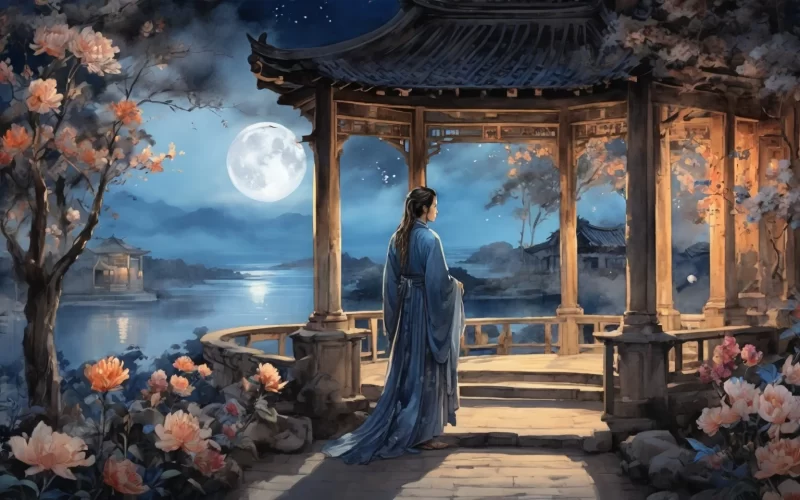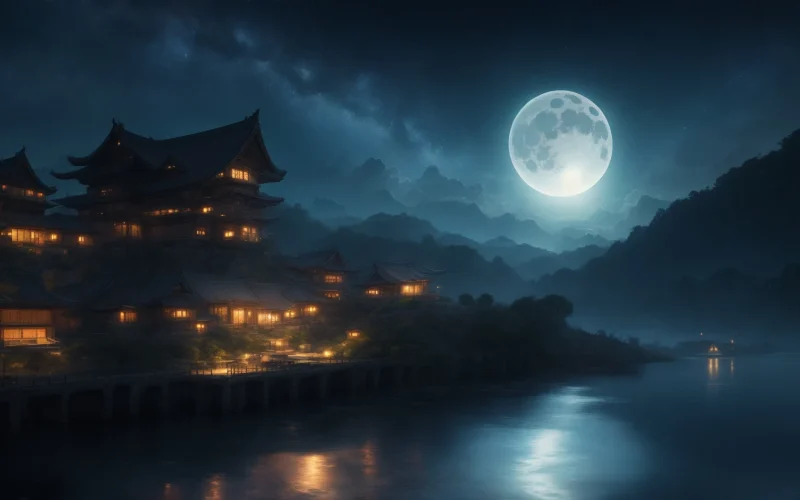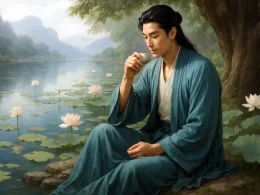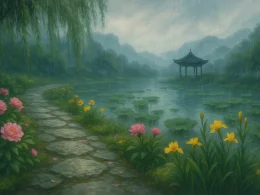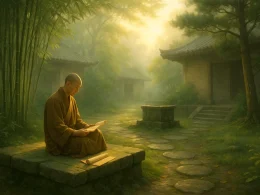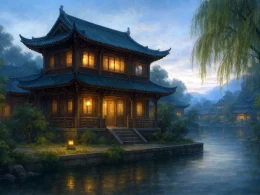I go in a dream to the house of Hsieh - Through a zigzag porch with arching rails To a court where the spring moon lights for ever Phantom flowers and a single figure.
Original Poem
「寄人」
张泌
别梦依依到谢家,小廊回合曲阑斜。
多情只有春庭月,犹为离人照落花。
Interpretation
This poem was composed by the late Tang lyricist Zhang Mi, expressing profound yearning for a lost love. Living through turbulent times with remarkable literary talent, Zhang crafted verses of ethereal melancholy. Likely written after being forced to separate from his beloved due to circumstance, convention or propriety, the work embodies restrained yet deeply felt longing. Through the dual motifs of "dream" and "moon," the poet constructs an emotional landscape both tangible and illusory, articulating love's solitary depths.
First Couplet: "别梦依依到谢家,小廊回合曲阑斜。"
Bié mèng yīyī dào Xiè jiā, xiǎo láng huíhé qǔ lán xié.
My parting dream lingers wistfully at your Xie-home,
Where winding corridors twist and railings lean as before.
The opening "parting dream" immediately establishes nocturnal visitation as the poem's central mechanism. "Xie-home" subtly alludes to the beloved through the literary figure Xie Daoyun, layering cultural resonance with personal memory. The precise architectural details—winding corridors, slanting railings—materialize the dreamscape while echoing shared moments now lost to waking life. This dream-pilgrimage to familiar spaces heightens the pathos of absence upon awakening.
Second Couplet: "多情只有春庭月,犹为离人照落花。"
Duōqíng zhǐyǒu chūn tíng yuè, yóu wèi lí rén zhào luòhuā.
Only the spring courtyard moon remains truly tender,
Still illuminating fallen blossoms for us parted lovers.
Here the poem achieves its emotional crescendo through celestial witness. The "spring courtyard moon" becomes the sole constant between past intimacy and present separation, its light now falling on "fallen blossoms"—a dual symbol of spring's passing and love's dissolution. The contrast between the moon's faithful luminosity and human absence transforms the satellite into a silent confidant, its very persistence underscoring the lovers' fractured connection. The image lingers as both elegy and fragile hope—that somewhere, the beloved might yet recall what the moonlight once touched.
Holistic Appreciation
This compact poem weaves lingering emotion through delicate imagery. Using dreams as a narrative thread, the poet depicts a return to familiar places in slumber—where scenes remain unchanged yet the beloved is absent—highlighting profound longing. Phrases like "narrow corridor" and "winding railings" create a wistful, intimate space suffused with quiet melancholy. The moon, as both witness and messenger of emotion, illuminates past joy and present solitude alike. Windblown petals in an empty courtyard mirror unspoken yearning, as the poet crafts an exquisite portrait of enduring yet hopeless love through restrained lyricism.
Artistic Merits
Blending scene and sentiment with tangible and ethereal elements, Zhang Bi masterfully employs dreams and symbolism to evoke deep emotional resonance. The opening couplet intertwines reality and illusion through dream logic; the second uses the moon’s constancy and falling petals’ transience as layered metaphors. The language, elegant yet vernacular-adjacent, carries folk-song simplicity while conveying sophisticated emotional depth. Within just twenty-eight characters, the poem expresses love’s quiet persistence with remarkable nuance—a testament to the poet’s refined artistry.
Insights
After parting, we often revisit lost intimacy through dreams, channeling unvoiced feelings into poetry. By framing love’s permanence and loss through moonlight and petals, the poet reminds us to cherish present bonds while honoring the beauty of steadfast affection amid heartbreak. Across eras, such tender sincerity remains universally moving—proof that true emotion transcends time.
Poem translator
Kiang Kanghu
About the poet
Zhang Bi(张泌), a Late Tang dynasty poet from Yangzhou, Jiangsu, specialized in lyrical poetry depicting feminine sensibilities and landscapes. His style bridges the gap between Wen Tingyun's ornate elegance and Wei Zhuang's restrained clarity. Recognized by Wang Guowei as a seminal figure of the Huajian School (a major early ci poetry movement), Zhang's limited surviving works significantly influenced Song dynasty lyricism.






